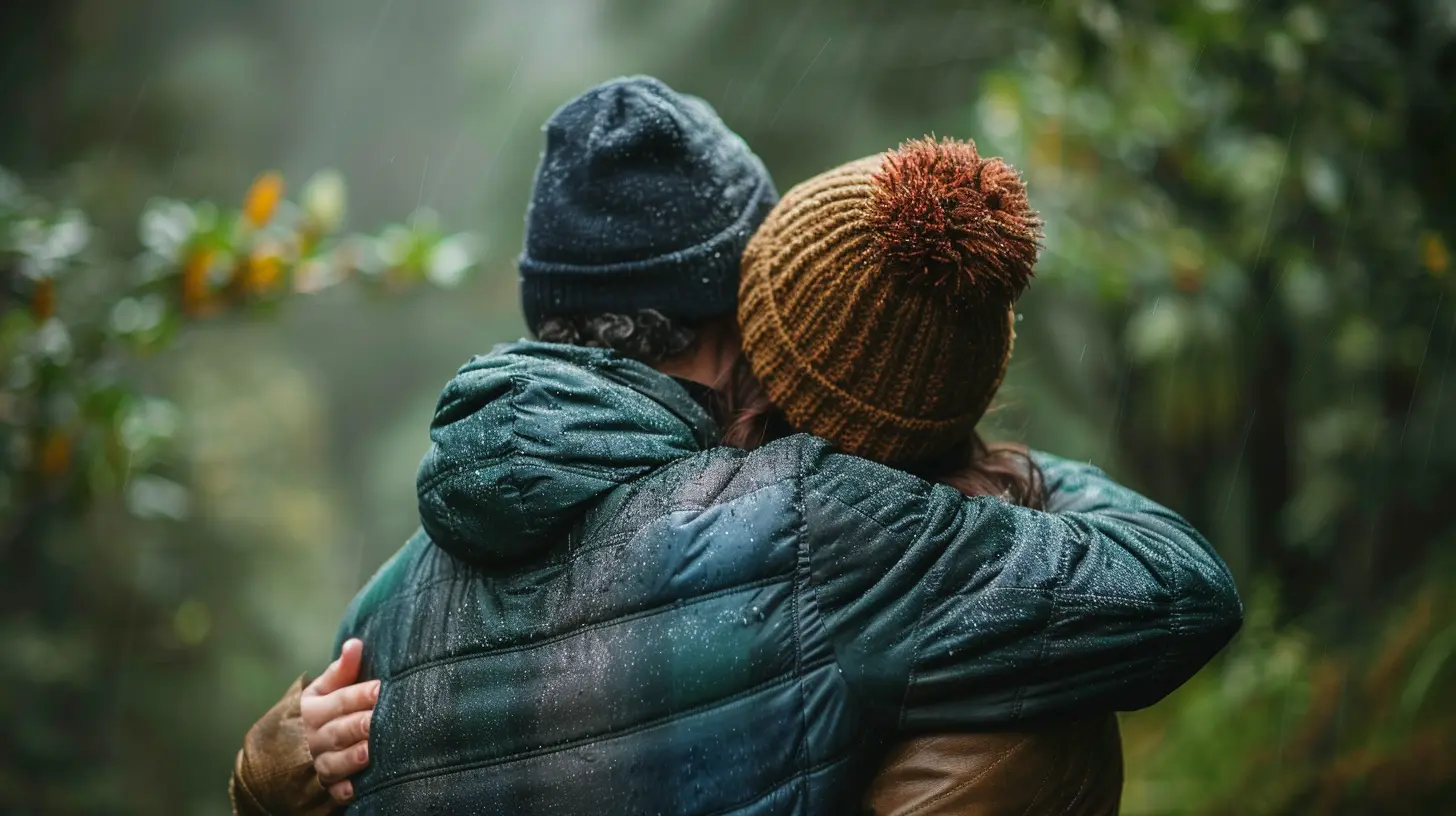Embracing Vulnerability for Stronger Relationships
20 May 2025
Let's face it—being vulnerable is terrifying. The idea of opening up, revealing your deepest fears, and letting someone see the raw, unfiltered version of you? Yeah, that’s enough to make anyone want to bolt. But here’s the kicker—without vulnerability, real connections are impossible.
If you want strong, meaningful relationships (whether romantic, familial, or friendships), vulnerability isn't optional. It’s the glue that holds everything together. So, let’s break down why vulnerability is so damn important and how you can start embracing it without feeling like you're free-falling into emotional chaos.

Why People Fear Vulnerability
Before we dive into how vulnerability strengthens relationships, let's address the elephant in the room—why do so many of us avoid it like the plague?Fear of Rejection
Nobody wants to be judged or dismissed for showing their true self. The thought of someone saying, “Nah, I don’t like that version of you” is enough to make anyone slap on a mask and keep things surface-level.Fear of Betrayal
Opening up means risking betrayal. Maybe you've been burned before—trusted someone who turned around and used your words against you. It stings, and the natural response is to put up walls. But here’s the problem: those walls don’t just keep the bad out, they also keep the good out.Societal Conditioning
“Be strong.” “Don’t show weakness.” “Bottle it up.” Sound familiar? Society has a messed-up way of conditioning people to believe that vulnerability equals weakness. But in reality, it takes immense strength to be open and honest.
How Vulnerability Builds Stronger Relationships
Alright, so we get it—being vulnerable is scary. But it’s also necessary. Here’s why.1. It Creates Deeper Emotional Intimacy
Want to turn a shallow connection into something real? Vulnerability is the bridge. When you share your fears, dreams, and insecurities, it invites the other person to do the same. Suddenly, you're not just two people exchanging pleasantries; you're two souls connecting on a deeper level.Think about your closest friends or your most meaningful relationships. Chances are, they didn’t happen because you talked about the weather. They happened because, at some point, you let each other in.
2. It Builds Trust
Trust isn’t built on perfection—it’s built on honesty. When you let someone see your flaws, yet they still accept you, it cements trust. On the flip side, hiding your true self can create a disconnect. People sense when you're holding back, and that lack of transparency can create distance.3. It Encourages Growth
Being vulnerable isn’t just about strengthening your existing relationships—it’s also about personal growth. The more you allow yourself to open up, the more confident you become in your authenticity. And when you fully embrace who you are, you attract people who love and respect the real you.4. It Reduces Misunderstandings
Miscommunication ruins relationships. Oftentimes, we assume people should just "know" how we feel, when in reality, they’re not mind readers. Vulnerability allows you to express what you need, feel, and want—eliminating confusion and unnecessary conflict.
How to Embrace Vulnerability Without Feeling Exposed
I get it—saying "just be vulnerable!" is easier said than done. So, here are some practical ways to start opening up without feeling like you're walking naked into a battlefield.1. Start Small
You don’t have to spill your deepest traumas on the first go. Start with something minor but personal—maybe sharing an uncomfortable thought, admitting you don’t have all the answers, or expressing a fear.2. Choose Safe People
Not everyone deserves access to your vulnerable side. Pay attention to how people respond when you open up. If they listen without judgment and reciprocate, that’s a green flag. If they dismiss or belittle you, they’re not the right audience.3. Accept That Not Everyone Will Get It
Not everyone will appreciate your vulnerability, and that’s okay. The right people will. Let go of the fear of being misunderstood or judged—it’s better to be real and attract those who value authenticity than to be fake and keep shallow connections.4. Stop Apologizing for Your Feelings
How many times have you said, “Sorry for being too emotional” or “Sorry for oversharing”? Stop that! Your feelings are valid. Own them. You don’t need to apologize for being human.5. Reframe Vulnerability as Strength
Vulnerability isn’t a weakness—it’s a superpower. It takes guts to be open in a world where many hide behind facades. When you embrace this mindset, revealing your true self starts to feel less scary and more empowering.
Real-Life Benefits of Embracing Vulnerability
Need proof that vulnerability changes lives? Let’s talk about some real benefits that come from ditching the emotional armor.1. Stronger Romantic Relationships
Ever notice that the best relationships don’t come from two flawless people, but from two imperfect people willing to be real with each other? Vulnerability strengthens love because it allows both partners to truly see and understand one another.2. More Fulfilling Friendships
Think about the best friendships you’ve had. They were probably the ones where you could be totally yourself, right? That’s because vulnerability fosters genuine connections, making friendships deeper and more meaningful.3. Improved Mental Health
Let’s be honest—bottling emotions is exhausting. It leads to anxiety, stress, and even resentment. When you practice vulnerability, you release emotional weight, making room for peace and self-acceptance.4. Greater Self-Confidence
When you stop pretending to be someone you’re not, you gain a stronger sense of self-worth. Confidence isn't about being perfect—it’s about being real and owning who you are, flaws and all.Final Thoughts: Vulnerability is Your Superpower
Look, I know embracing vulnerability isn’t easy. It requires courage, trust, and a willingness to step outside your comfort zone. But the rewards? They’re life-changing.When you start showing up as your authentic self—fears, quirks, imperfections, and all—you attract deeper connections, stronger relationships, and a more fulfilled life. Vulnerability isn’t something to be feared; it’s something to be celebrated.
So, go ahead. Drop the walls. Let the right people in. Because the strongest relationships aren’t built on perfection—they’re built on honesty, trust, and the courage to be unapologetically you.
all images in this post were generated using AI tools
Category:
Self HelpAuthor:

Matilda Whitley
Discussion
rate this article
2 comments
Haze Watson
Embracing vulnerability? Is that like admitting I cried during a rom-com? If so, count me in! I’ll hug my feelings tighter than my favorite blanket. Who knew emotional exposure could lead to stronger relationships—and fewer awkward moments at dinner parties?
May 30, 2025 at 2:29 AM

Matilda Whitley
Absolutely! Embracing vulnerability opens the door to deeper connections and authenticity, making those moments—and relationships—much richer. Keep hugging those feelings!
Tabitha Mendoza
Embracing vulnerability fosters authentic connections, yet it requires balancing openness with the need for personal boundaries.
May 20, 2025 at 2:16 PM

Matilda Whitley
Thank you for your insightful comment! You're absolutely right—balancing vulnerability with boundaries is crucial for nurturing genuine connections while maintaining our well-being.


